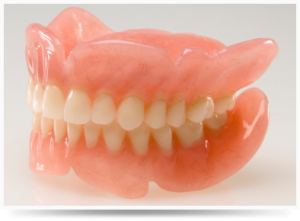instructions for looking after dentures
Cleaning and maintenence of your dentures:
- Dentures require cleaning after meals, at least twice a day
- Use a specially designed brush and unperfumed mild soap or approved denture cleaner following the instructions for that product.
- Put water in the sink while brushing so they dont break if dropped
- Avoid using hard brushes and avoid toothpaste as both are too abrasive and will damage the denture.
- Avoid very hot/boiling water and leaving dentures out in hot sun as both of these can warp dentures.
- Avoid detergents, bleaches, methylated spirits and other strong chemicals
- Avoid leaving the denture near animals (especially dogs) as they smell the saliva and chew it up!
- For Duraflex dentures only clean the denture as follows: after brushing your teeth rinse off the toothbrush as usual then gently brush the denture. It will have a very small amount of toothpaste residue on it and this is enough to clean it. A lot of toothpaste is too abrasive but a tiny amount is perfect and wont damage Duraflex dentures.
- The denture is a foreign body which provides more surfaces for plaque to collect, so it is even more important to brush all teeth and especially those neighbouring the denture very thoroughly. This will prevent the gum health going downhill.
- For new dentures it is generally better to do more small adjustments as required than fewer bigger ones as these larger ones risk unnecessarily removing too much from the denture thus weakening it. The mouth changes and adapts to the denture over time so it’s best to go gradually.
Instructions for immediate dentures:
- Impressions are taken and the denture made first. On the day of the extraction(s) the denture is inserted after the tooth/teeth have been removed while you are in the surgery.
- Follow all the usual postoperative instructions given to you regarding extractions.
- The immediate denture needs to be left in place undisturbed for the first 24 hours, thus for the first night it is necessary to sleep with them in. This acts to prevent swelling and speed up the healing.
- If any bleeding continues during the first 24h, bite using firm pressure on a gauze pack for 30- 45min with the denture in. Feel free to call me at any time if you are concerned.
- After the first 24 hours I will generally see you to remove the denture, rinse the socket and review things. It is necessary to start the salt water mouthrinsing after the first 24 hours: remove the denture and rinse the socket with salt water (1 teaspoon of salt in a cup of lukewarm water) and rinse the denture with water. This flushes out food etc from the socket and helps to relieve pain and prevent infection. Continue salt water rinsing as much as you can for the next week; the more the better, especially after meals.
- After the first 24 hours you can keep the denture in during the day, taking it out for rinsing the socket, cleaning after meals and to sleep.
- For the first 3-4 days, wearing the denture more is better as it will compress the socket preventing swelling and aiding healing. After this you can use it for chewing and aesthetics and take it out if you prefer at other times.
- After this first night it is essential to remove the denture during the nights from then on as it becomes an irritant to the socket; only one night is spent sleeping with it in.
- Start by eating soft foods only and avoid sharp, hard or sticky foods.
- It is very important to attend the review appointment after 1-2 weeks; it is usual to need a small adjustment during the healing period.
- If the denture is rubbing, its better to take it out to prevent an ulcer. For the few hours before the adjustment appointment put it in as this will allow me to see a small red area and know where to adjust it.
The socket takes around 3 months to heal completely. After this time the definitive replacement of the tooth/teeth can be made. During healing the tissues shrink and the fit of the immediate denture may become loose. It then often needs either relining or remaking. The initial immediate denture can be kept as an emergency spare if a new denture is made.

